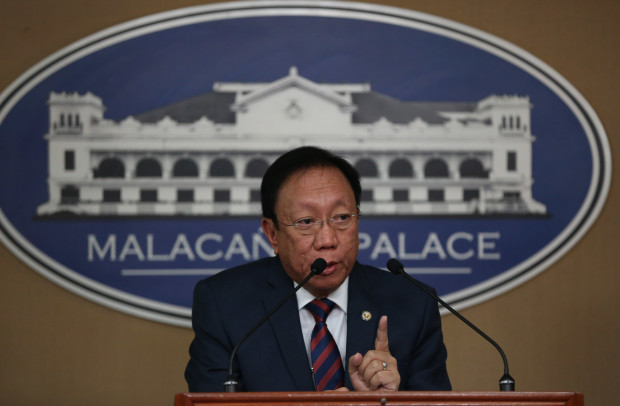Calida: Duterte can use martial law only in ‘very extreme cases’

Solicitor General Jose Calida elaborates on President Rodrigo Roa Duterte’s statement on the declaration of martial law Calida during a press briefing in Malacañan on January 19, 2017. Calida insists that the President’s statement was hypothetical and it was just a reiteration of his commitment to protect the Filipinos from security threats. TOTO LOZANO/ Presidential Photo
What kind of scenario would allow President Rodrigo Duterte to declare martial law even if the Supreme Court is against it?
One that involves drug lords and other groups working together to target him or the public, according to Solicitor General Jose Calida.
“We are talking here about certain conditions that cannot be predicted,” he said during a Palace briefing.
“However, it must be very extreme. What if they will bomb Malacañang? Put bomb(s) in our malls. The drug lords will hire assassins to kill him. Some parties might be (in) cahoots in (this) plot,” he explained.
“There is a breakdown of law and order. Somebody should act,” Calida said.
Article continues after this advertisementREAD: Duterte: No compelling reason to declare martial law
Article continues after this advertisementDuterte on Wednesday said that he can decide to declare martial law even if the Supreme Court decides against it.
He said if Congress agrees with him and the High Court opposes it, he can break the stalemate between the two branches of government.
“Supreme Court says no; Congress says yes. Who decides? Of course the President,” he said during an event in Nueva Ecija.
Asked to clarify, Calida said the “final arbiter of the Constitution is the Supreme Court.”
However, he said the President can decide to still impose martial law “when there really is a clear and present danger in the country.”
“He will not allow lawlessness to rule our country. If the other branches of the government will not help him, what will we do?” Calida said.
READ: Duterte to declare martial law if situation in PH turns ‘virulent’
Under the 1987 Constitution, the country can be placed under martial law if there is invasion or rebellion.
At the same time, Calida said Duterte can go beyond the Constitution, like what happened during the Edsa People Power.
“Just like what Cory (Aquino) did. They did what was outside the Constitution,” he said.
Asked to describe what kind of circumstance would allow that, the Solicitor General said, “I cannot really describe the exact scenario. But it is something like this, when the country is in danger … criminality that cannot be stopped anymore.”
“If the country face(s) imminent danger and nobody is acting, then the welfare of the people is the supreme law,” he said. CBB/rga